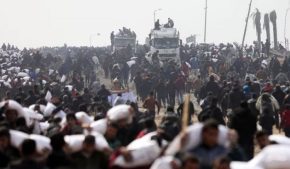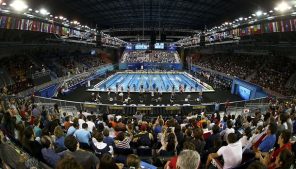The fact that the FIFA World Cup is taking place in Qatar has seen a deluge of criticism, particularly from European countries.
First, there was the controversy over the bid process, but that came to nought, despite some evidence in various media investigations to the contrary. Then Qatar’s human rights record began getting much attention, and it increased to a frenzy in the weeks leading up to the start of the tournament.
As the matches have got underway, it hasn’t died down, especially with the decision to bar captains from wearing the One Love armband. This was doubled down by the decision to further limit alcohol sales, just two days before the tournament. That just provided more ammunition to the critics.
So what exactly are the issues? The main ones are (i) the treatment of migrant workers, (ii) the status of women, and (iii) the fact that homosexuality is illegal in the country.
FIFA has arguably made it worse, by asking people to focus on soccer instead of human rights.
It’s a classic example of “sports washing”, a criticism also levelled at the big, big money LIV Golf Tour, which is bankrolled by the Saudi Public Investment Fund, but with no concern for profit. But I have a contrary question to ask. If this World Cup wasn’t taking place in Qatar, would you be aware of any of these issues? And would the Qatari rulers have done anything to make the lives of migrant workers just a little better?
There’s no consensus about how many migrant workers may have died in order to build some of the spectacular stadia we’ve seen around Doha.
The figure of 15 000 quoted by the Worker Welfare Agency is misleading, as that is the number of foreigners who died in Qatar over the past ten years or so.
Only a percentage of those were involved in projects linked to the World Cup. But the official Qatar government figure of three is also obviously not true. That doesn’t take into account anyone who didn’t die on site, or on other projects, such as roads or airports, that wouldn’t have been undertaken if the World Cup wasn’t happening.
Some fact-checking organisations estimate that it’s probably around 6-7 000. Too many, no question.
But the thing is, we now know about the migrant worker issue. They are mostly from the sub-continent – India, Pakistan, Bangladesh and Sri Lanka. Contrary to perception, most are not in construction, but are women employed as domestic workers. But the focus has resulted in the Ministry of Labour adopting a standardized contract, which the International Labour Organisation says will align their rights with other private sector workers.
Reasonable time off is still one of the biggest difficulties these unskilled workers face, as well as appalling living conditions. Further focus has been brought by media attention on the many players and squads who visited migrant workers, and gave them small soccer clinics, in the week leading up to the opening ceremony.
There have been questions about the status of women. Qatar is a Muslim state, with laws regarding women in place that align with that. It cannot be up to a Christian or secular person, entity or government to declare that is immoral. Having said that, when women do rise up in protest, as they have in Iran, it is important, and essential, that they are given whatever support and protection they need. The reality is that female visitors to Qatar do not have to do much other than show respect – cover their shoulders and knees. Simple cap sleeves and capri pants are perfectly acceptable. Having the World Cup in Qatar gives focus to the difficulties women face. But make no mistake, it is local women who are discriminated against, not visitors.
The law against homosexuality in Qatar is again a complex argument. How do you respect their position if, as a member of the LGBTQI community, your very presence and existence is prosecutable? The law allows for three years imprisonment, flogging and the death penalty for acts of homosexuality. Qatar made it clear that LGBTQI people are welcome at the World Cup, and that sharing hotel rooms would not be barred. Just don’t flaunt it. FIFA has now asked security at all stadia not to bar anyone entering who’s wearing something bearing the rainbow symbol. But the reality is that there has been discrimination, and protesting against the discrimination has been actively discouraged, sometimes through intimidation. This leads us to the furore over the One Love armband.
The One Love campaign was started by the Dutch Football Federation two years ago, to express their support for the unification of all people. In September this year, nine other European nations, including seven that are at the FIFA World Cup, decided they would join the campaign and use the armband in all upcoming matches. This included the FIFA World Cup and the EUFA Nations League. The armband makes no mention of LGBTQI rights, but the rainbow colours are universally recognized. Two days before the start, FIFA declared that anyone wearing the armband would be issued with an immediate yellow card on the field. With many of these teams amongst the favourites, their federations said the risks were too high.
For me, the right to be who I want to be, without fear of prosecution, is a basic human right. Women shouldn’t have to ask anyone’s permission to pursue a career. And no one should ever have to hide who they love. Discrimination on any basis is unjustifiable. And therein lies the rub. If I demand the right to be who I want to be and think what I like, surely I should grant others the same privilege. Even if those opinions differ from mine. Because I also have the right not to associate with those whose opinions I find morally reprehensible. As long as what they say and do doesn’t endanger lives or amount to hate speech. So you tell me, does standing up for my beliefs automatically mean I am disrespecting yours? FIFA president Gianni Infantino thinks Europeans have done so much wrong in the past, that it’s hypocritical for them to speak out. I don’t agree. With respect, speak out. With respect, be true to yourself. It’s not mutually exclusive. It’s the rigid stand that FIFA and the Qatari authorities have taken that has created the problem, not the protest action itself.
And the lesson. For countries or entities planning on using sport to make their policies or plans look good, sometimes the spotlight is a double-edged sword. Infantino could very well find his support for Qatar results in him having to find a new job when the next FIFA elections take place in Kigali, Rwanda in March next year.
Janet Whitton is a Specialist Researcher at SABC News.






